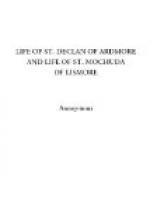(III.) No one in Eastern Munster requires to be told how strong is the cult of St. Declan throughout Decies and the adjacent territory. It is hardly too much to say that the Declan tradition in Waterford and Cork is a spiritual actuality, extraordinary and unique, even in a land which till recently paid special popular honour to its local saints. In traditional popular regard Declan in the Decies has ever stood first, foremost, and pioneer. Carthage, founder of the tribal see, has held and holds in the imagination of the people only a secondary place. Declan, whencesoever or whenever he came, is regarded as the spiritual father to whom the Deisi owe the gift of faith. How far this tradition and the implied belief in Declan’s priority and independent mission are derived from circulation of the “Life” throughout Munster in the last few centuries it is difficult to gauge, but the tradition seems to have flourished as vigorously in the days of Colgan as it does to-day. Declan’s “pattern” at Ardmore continues to be still the most noted celebration of its kind in Ireland. A few years ago it was participated in by as many as fourteen thousand people from all parts of Waterford, Cork, and Tipperary. The scenes and ceremonies have been so frequently described that it is not necessary to recount them here—suffice it to say that the devotional practices and, in fact, the whole celebration is of a purely popular character receiving no approbation, and but bare toleration, from church or clergy. Even to the present day Declan’s name is borne as their praenomen by hundreds of Waterford men, and, before introduction of the modern practice of christening with foolish foreign names, its use was far more common, as the ancient baptismal registers of Ardmore, Old Parish, and Clashmore attest. On the other hand Declan’s name is associated with comparatively few places in the Decies. Of these the best known is Relig Deaglain, a disused graveyard and early church site on the townland of Drumroe, near Cappoquin. There was also an ancient church called Killdeglain, near Stradbally.
Against the theory of the pre-Patrician or citra-Patrician mission we have first the objection, which really has no weight, and which we shall not stop to discuss, that it is impossible for Christianity at that early date to have found its way to this distant island, beyond the boundary of the world. An argument on a different plane is (I.), the undoubtedly contradictory and inconsistent character of the Life. It is easy however to exaggerate the importance of this point. Modern critical methods were undreamed of in the days of our hagiographer, who wrote, moreover, for edification only in a credulous age. Most of the historical documents of the period are in a greater or less degree uncritical but that does not discredit their testimony however much it may confuse their editors. It can be urged moreover that two mutually incompatible genealogies of the saint are given. The genealogy given by MacFirbisigh seems in fact to disagree in almost every possible detail with the genealogy in 23 M. 50 R.I.A. That however is like an argument that Declan never existed. It really suggests and almost postulates the existence of a second Declan whose Acts and those of our Declan have become mutually confused.




